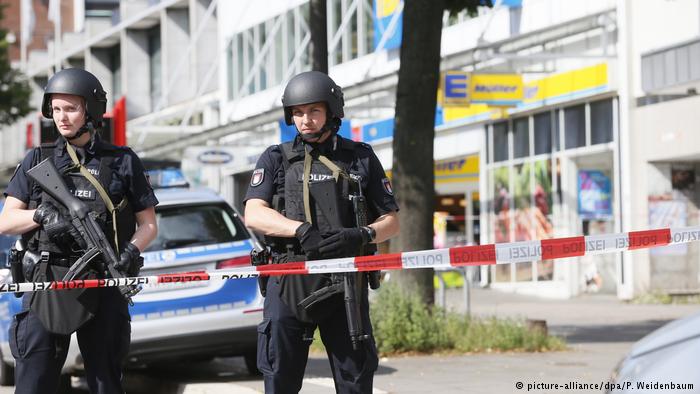Police on Saturday said they had searched a refugee shelter in the Hamburg district of Langenhorn, where the 26-year-old suspect, from the United Arab Emirates, was believed to have been staying.
A police spokesman did not say whether officers had found any item of interest. “We cannot make an announcement about whether we found anything at this stage,” said the spokesman.
A 50-year-old man was killed in the attack at a branch of the German supermarket chain Edeka, in Hamburg’s Barmbek district.
A 50-year-old woman and four men aged between 19 and 64 were all injured, as well as a 35-year-old man who chased and overpowered the suspect.
The attacker, who was arrested by police, was said to have shouted “Allahu Akbar” (God is the Greatest) during the rampage.
Call to speed deportations
Hamburg Mayor Olaf Scholz said the attack had been motivated by “hate.”
It appeared that the suspect was facing deportation but this had not proceeded because necessary papers were lacking, Scholz said.
“I am furious that the offender is apparently someone who has claimed protection with us in Germany and then directed his hate against us.” the mayor added.
“These criminals want to poison our free society with fear, but they will not succeed,” said Scholz.
Speaking of a “malicious attack,” Scholz added that the case showed “all the more urgently that these legal and practical barriers to deportation must be removed.”
Drug and mental issues?
The website of the Spiegel news magazine said the individual was named Ahmad A., who had arrived in Germany seeking asylum and had contact with the Islamist scene, as well as a history of drug use and mental health problems.
Germany has been on high alert over the possibility of another Islamist attack since Anis Amri drove a truck into a crowd at a Berlin Christmas marker in December last year, killing 12 people and injuring 48 others.
Like the alleged Hamburg attacker, Amri was a failed asylum seeker who could not be deported for lack of documents.
The similarity between the cases risks reopening wounds over Chancellor Angela Merkel’s decision to allow more than a million migrants into Germany since 2015.
DW



